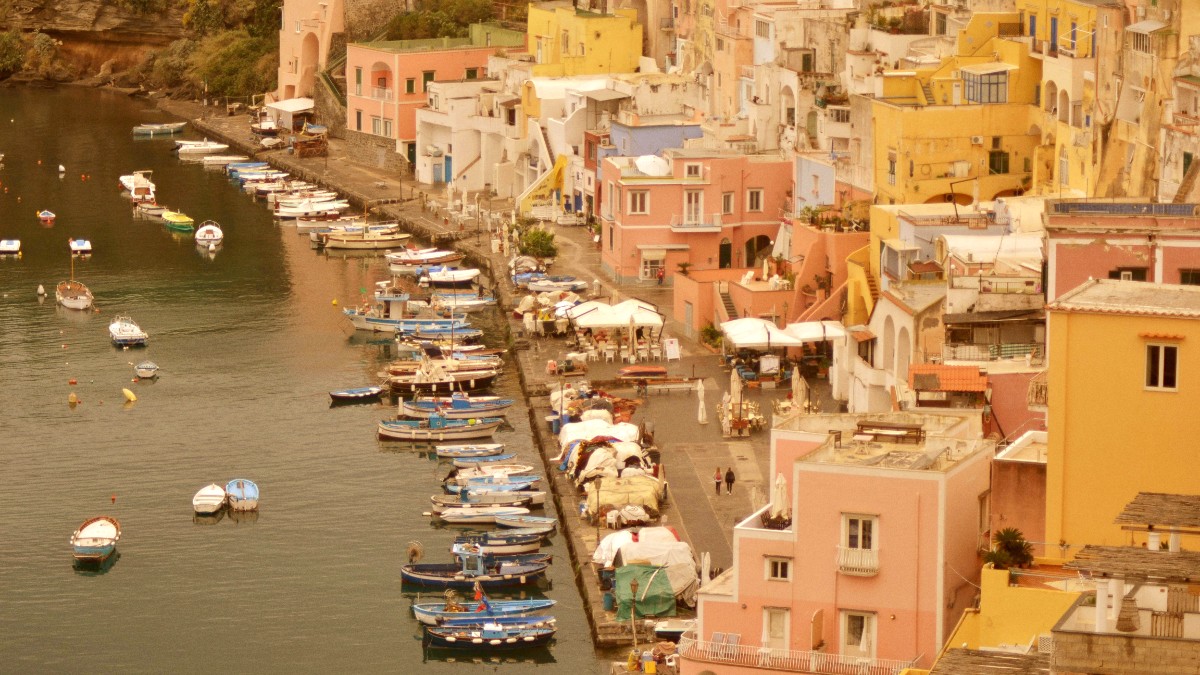
Campania, Italy
Italy has good mobile network coverage, including on Procida. Major providers include Vodafone, TIM, and WindTre. Purchase tourist-friendly SIM cards at Naples airport or at phone shops on the mainland. Remember to bring your passport for registration. Wi-Fi is generally available and free in most hotels, B&Bs, and many restaurants and cafes on Procida.
Italian is the official language. A local Procidan dialect is spoken among older residents, though standard Italian is universally understood. English is commonly spoken in tourist-oriented businesses. For learning basic phrases, consider Rosetta Stone.
Post offices ("Poste Italiane") are available on Procida for sending postcards or letters. Look for the yellow post boxes.
A few basic phrases can significantly enhance your interactions with locals.
Locals appreciate any attempt to speak Italian, even if it's just a few words.
Familiarize yourself with typical operating hours to plan your days efficiently.
Typically 9 AM - 1 PM, then 4 PM - 8 PM (afternoon break). Many small shops close on Sundays.
Lunch service 1 PM - 3 PM. Dinner from 8 PM onwards, often later in summer. Many close between lunch and dinner.
Open early (around 7 AM) for breakfast, until late evening (10 PM - midnight).
Banks typically operate on weekdays from 8:30 AM to 1:30 PM and sometimes reopen briefly in the afternoon from 2:30 PM to 4:30 PM.
Italy observes various public holidays (e.g., Easter, Ferragosto - August 15th, Christmas, New Year's Day). On these days, reduced public transport services, closures of some businesses, and increased crowds may occur.
Always check current timetables for ferry services and specific attractions for your travel dates.
Observing local customs enriches your experience and shows respect for the community.
Always greet shopkeepers, restaurant staff, and locals with "Buongiorno" or "Buonasera." "Ciao" is informal. Casual clothing is fine, but cover shoulders and knees when visiting churches or religious sites.
Tipping is not mandatory. A "coperto" (cover charge) is often included. If service is exceptional and no service charge appears, a small tip (5-10% or rounding up) is appreciated.
Generally, photography of public spaces and landmarks is acceptable. Always ask for permission before photographing individuals, especially children, to respect their privacy.
Avoid discussions of politics or religion with strangers. Displaying excessive public affection can be frowned upon in more traditional settings. Maintain a respectful distance in conversations.
Procida's traditional infrastructure presents significant accessibility challenges. Many attractions involve walking and climbing steps.
Procida's unique geography presents challenges for travelers with mobility needs.
Procida's terrain is hilly, and its charming villages feature narrow, steep streets, numerous stairs, and cobblestones. This traditional infrastructure presents significant accessibility challenges. Many paths and attractions require navigating uneven surfaces and steps.
Very limited accessible infrastructure exists. Public buses are not wheelchair accessible due to their size and design. Many of the most iconic attractions, like Marina Corricella and Terra Murata, involve considerable walking and climbing steps, making them difficult for those with mobility aids.
Specific specialized services for travelers with visual or hearing impairments are not widely advertised or readily available on the island.
If you have specific mobility needs, contacting individual hotels or local tourism offices directly for detailed accessibility information before your trip is highly recommended. They can provide precise details about steps, ramps, and room layouts.
Thoroughly research specific routes and attractions for accessibility before arriving.
Email Tourist OfficeMaintain a flexible itinerary to adjust to any unforeseen accessibility challenges.
Call Tourist OfficeFor significant mobility needs, consider traveling with an assistant or a companion.
Official Procida TourismProcida's traditional layout means accessibility limitations for those with mobility challenges. Many areas involve stairs and uneven surfaces.